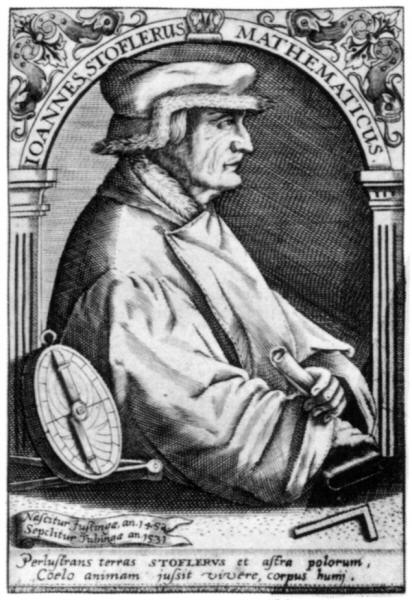<Back to Index>
- Astronomer Johannes Stöffler, 1452
- Poet Emily Elizabeth Dickinson, 1830
- Draughtsman and Painter Cornelis Pronk, 1691
PAGE SPONSOR

Johannes Stöffler (also Stöfler, Stoffler, Stoeffler) (10 December 1452 – 16 February 1531) was a German mathematician, astronomer, astrologer, priest, maker of astronomical instruments and professor at the University of Tübingen.
Johannes Stöffler was born on 10 December 1452, in Justingen near Blaubeuren on the Swabian Alb. Having received his basic education at the Blaubeuren monastery school, he registered at the newly founded University of Ingolstadt on 21 April 1472, where he was consequently promoted Baccalaureus in September 1473 and Magister in January 1476. After finishing his studies he obtained the parish of Justingen where he, besides his clerical obligations, concerned himself with astronomy, astrology and the making of astronomical instruments, clocks and celestial globes. He conducted a lively correspondence with leading humanists - for example, Johannes Reuchlin, for whom he made an Equatorium and wrote horoscopes.
In 1499 he predicted that a deluge would cover the world on 20 February 1524. In 1507, at the instigation of Duke Ulrich I he received the newly established chair of mathematics and astronomy at the University of Tübingen, where he excelled in rich teaching and publication activities and finally was elected rector in 1522. Philipp Melanchthon and Sebastian Münster rank among his most famous students. When a plague epidemic forced the division and relocation of his university to the surrounding countryside in 1530, Stöffler went to Blaubeuren and died there on 16 February 1531 of the plague. He was buried in the choir of the collegiate church (Stiftskirche) in Tübingen.
The lunar crater "Stöfler" (with one f) was named in his honor.